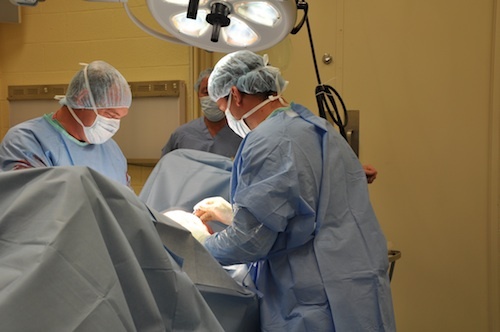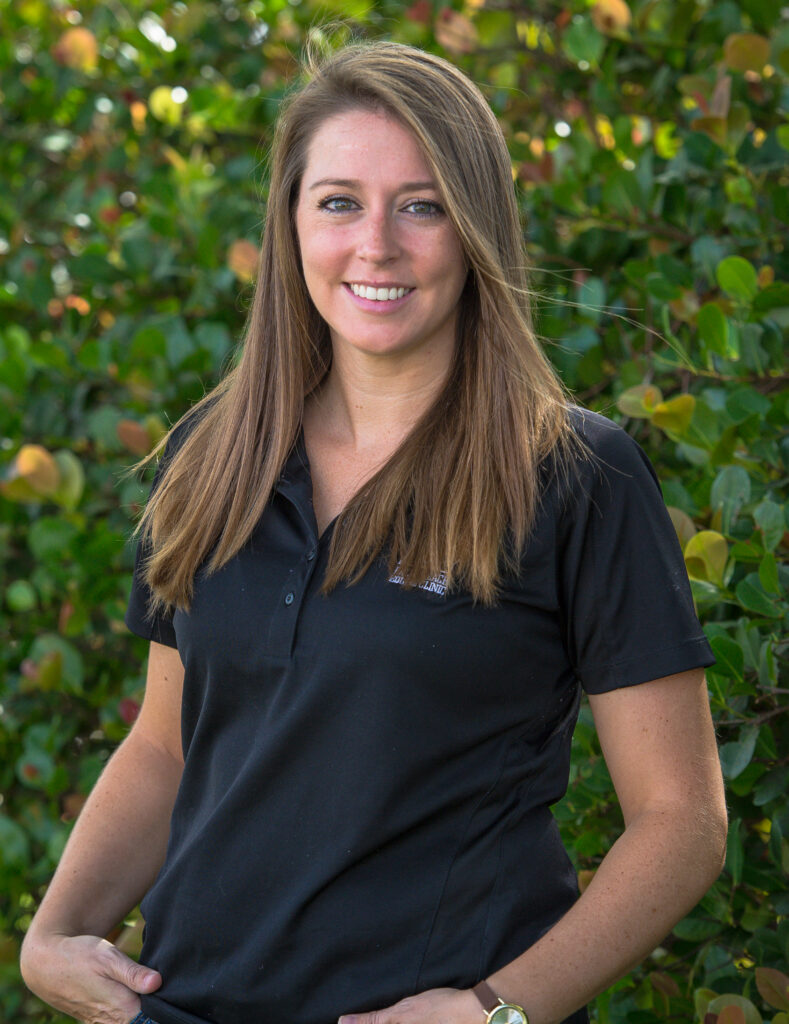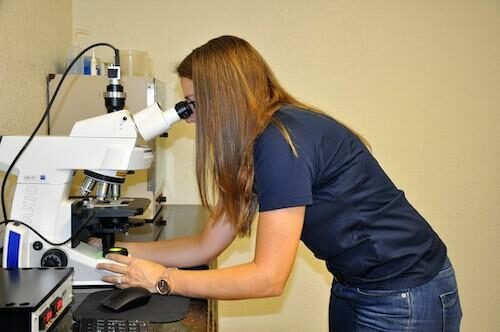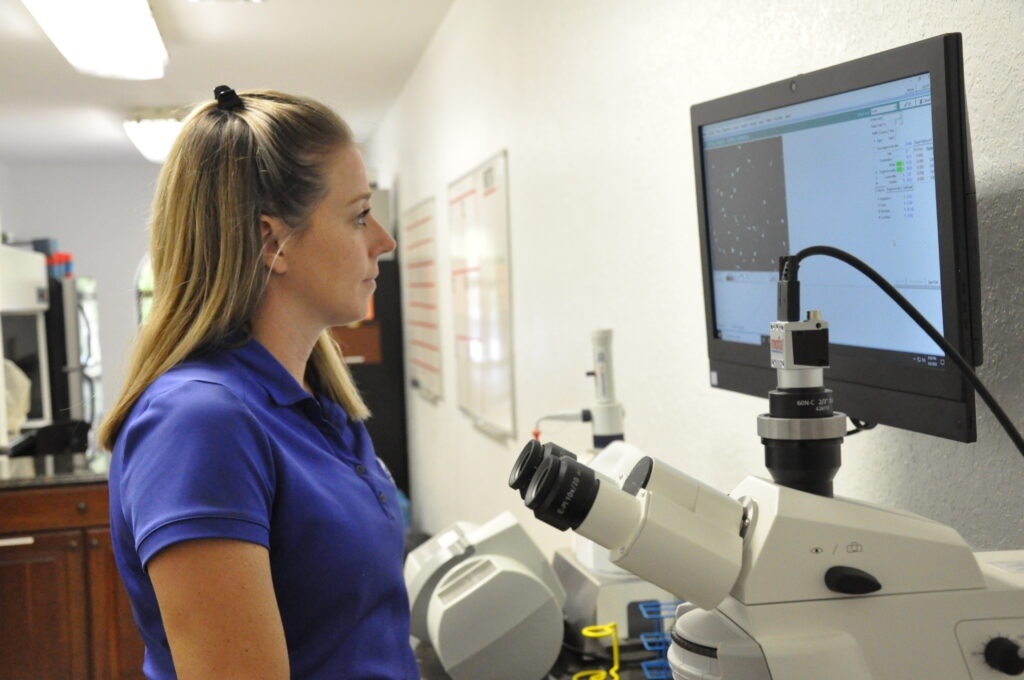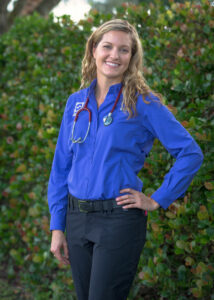Tag: veterinarians
Palm Beach Equine Clinic’s surgical team leader, Dr. Robert Brusie, is a nationally renowned board-certified surgeon whose surgical specialties include orthopedic, arthroscopic, and emergency cases. Dr. Brusie has been the head surgeon with Palm Beach Equine Clinic for the last 20 years and is a beloved part of the team.
Dr. Brusie graduated from Michigan State University (MSU) College of Veterinary Medicine. He completed his surgical residency at the Marion DuPont Scott Equine Center in Virginia in 1989 and has been in private practice ever since. He became a Diplomate of the American College of Veterinary Surgeons in 1994. Dr. Brusie joined the Palm Beach Equine Clinic team in 1996.
Board-certified surgeon, Dr. Brusie is recognized for his expertise in colic surgery, as well as for his skill in arthroscopic surgery. His surgical experience expands the clinic’s progressive care in both emergency and elective procedures. He has published articles on numerous topics, including the equine intestinal tract and septic arthritis in horses. Dr. Brusie is married and has three daughters. Read on to find out more about Dr. Brusie!
What is your background with horses?
I grew up on a farm in Michigan. We had usually between 200 and 600 head of cattle and always between four to six horses. Our horses were cow ponies or driving horses. My dad loved horses and had to have them around. My family has owned our farm for six generations and it pretty much occupied all of our time besides sports and school. Needless to say, we didn’t have much time to show horses.
When and why did you decide to become a veterinarian? Did you know you wanted to be a surgeon from the start?
I decided to become a veterinarian at an early age. I think I was seven or eight years old when I pulled my first calf. One of my dad’s hired men called me “Doc” when I was about that age. When I went to college, my plan was to become a large animal veterinarian and live in my hometown and continue to farm part-time with my three brothers. All of that changed when I was in veterinary school at MSU. Dr. Ed Scott was one of the five surgeons there; he was a gifted surgeon and a great teacher. He steered me into an equine internship at Auburn University. It was one of those things that the more you did, the more you wanted to do to improve yourself. I operated on my first colic by myself when I was three weeks out of vet school (32 years ago).
How did you first start working at Palm Beach Equine Clinic?
I was a surgeon at a clinic in Atlanta, and in 1996 I had performed a surgery for a client of Dr. Paul Wollenman’s. He had started this practice in 1975 and asked me if I needed a job. I was planning on staying in Atlanta for the rest of my career. I received phone calls from the other two partners over the next nine months, and eventually with encouragement from my fiancé, now wife, Melissa, I took the job.
What do you love most about working at Palm Beach Equine Clinic?
We have an exceptional group of veterinarians and staff here. The depth and scope of our veterinarians is amazing due to the large caseload. On any individual case, there may be two to three doctors that have input on the case to ensure no stone is left unturned. Additionally, we are so privileged to work on some of the best show, race, and polo horses in the world. It is truly an honor.
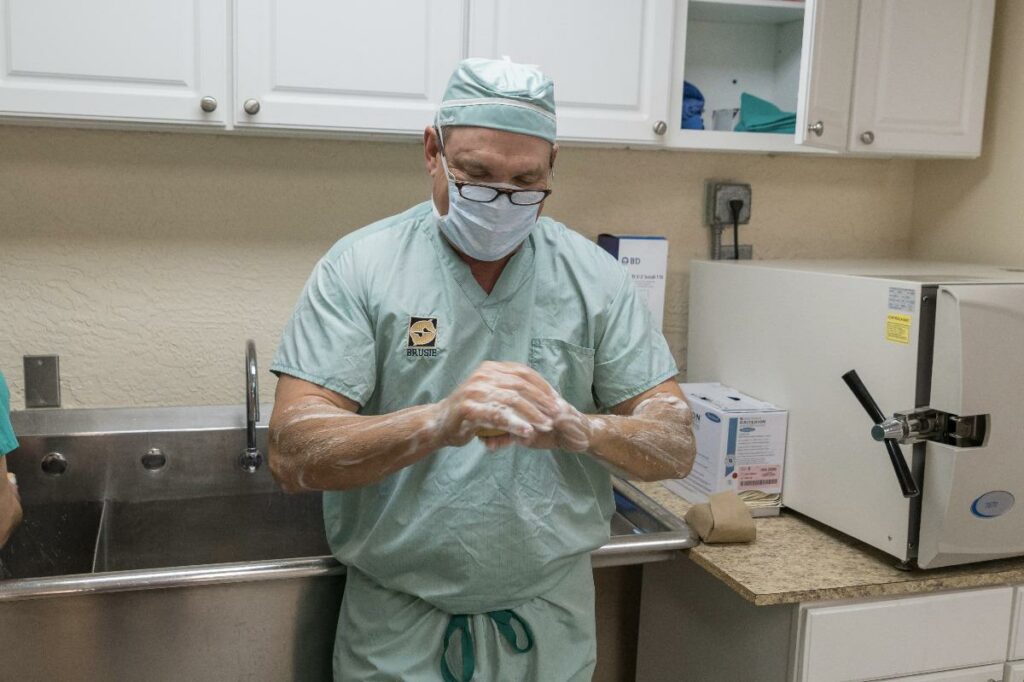
What sets the surgical services at Palm Beach Equine Clinic apart?
Between Dr. Jorge Gomez, Dr. Weston Davis, and myself, we perform just about every type of soft tissue and orthopedic surgeries that are done in our field. Personally, my greatest sense of success is when I see a horse back after surgery going as well or better than it was prior to surgery.
What are the biggest changes you have seen in sport horse medicine over the years?
Currently, the most exciting thing we see going on in medicine is regenerative therapy. Twelve to 15 years ago, we were harvesting bone marrow from the sternum and injecting it into lesions in tendons and ligaments. Now we manipulate the bone marrow or other sources of stem cells to promote more rapid and more functional healing of some of these injuries. I can assure you that in 10 to 20 years what we are doing now will seem stone-aged by then. There are some very clever minds performing some serious research in this field.
How do you stay up-to-date on new medical advances?
Every veterinarian at Palm Beach Equine Clinic tries to attend as many meetings as time allows. We also do a weekly journal club at our clinic to discuss recently published papers in veterinary and human medicine and surgery.
What is the most interesting or challenging surgery that you have done?
Dr. Gomez and I had a three-year-old racehorse that had split his P1 (long pastern bone) and cannon bone in the same leg in a race. We were able to piece together both bones perfectly and the horse recovered brilliantly. He probably could have returned to racing, however, the owners elected to retire him to life as a breeding stallion.
What is something interesting that people may not know about you?
I have three daughters who I am very proud of and tend to brag on maybe a little too much.
How else is the family involved in horses?
My wife [Melissa] and youngest daughter [Kayla] are horse nuts in the true sense of the word. Anything to do with horses, especially show hunters, they are dialed in. Melissa loves riding, and Kayla shows in hunters and equitation.
What makes Palm Beach Equine Clinic a special place for you?
I am blessed to have three good men as business partners. They are my good friends and great people. We are very lucky to have 20-plus veterinarians working with us who are very knowledgeable and caring individuals. We feel like a little practice, but with a lot of people who just get the job done.
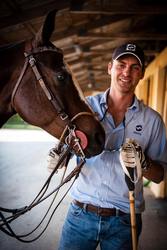
Dr. Bryan Dubynsky joined the team of veterinarians at Palm Beach Equine Clinic in 2009 and specializes in treating sport horses, working to return them to top performance after injury or complication. Get to know Dr. Dubynsky:
1. Where did you grow up and what is your background with horses?
I grew up in Northern Indiana on a horse farm. I was fortunate enough to breed horses, show on the Midwestern circuit, and train our horses. My father is a physician and I’ve always grown up with an interest in medicine. Choosing to become a veterinarian seemed to be a natural fit that combined my love for horses and medicine.
2. Who has been the biggest influence in your life or career? What did they teach you?
I spent my entire childhood from eight to 18 years old with a third-generation horse trainer from Kentucky. He taught me horsemanship and patience, two crucial parts of a good foundation for successfully working around horses every day. If I could give advice to anyone thinking about becoming a veterinarian, it would be to seek out the top people in the industry and work with them. Learn as much as you possibly can from the people who have been practicing for a long time.
3. What is your specialty/main focus as a vet?
My main focus and interest is sport horse medicine. I love focusing on improving athletic performance and treating sports-related injuries to help clients get their equine partners back to the top!
4. What do you love about your job?
I love working at Palm Beach Equine Clinic for the exceptional medical and surgical capabilities and experiences available. I also love the camaraderie of all the employees; we really work as a team! Teamwork is paramount for making the clinic successful. I love the opportunities to travel throughout North America and Europe to see really cool places through work with my clients. I love working with the competition horses and being a part of the atmosphere of high-level competition, as well as caring for the sweet trail horses at home.
5. What is one of the most interesting cases you have worked on?
My own horse, Batman. He was an abandoned polo pony suffering from West Nile Virus. He was paralyzed for three days and no one wanted to treat him. We treated him with intensive care for three days and used a tractor as a last-ditch effort to get him to stand. He has since made a full recovery and is currently playing polo.
Dr. Selina Passante-Watt traded in the cold winters of Canada for the sunny shores of South Florida and joined the practice at Palm Beach Equine Clinic in the fall of 2013. A veterinarian at just 32 years of age, Dr. Passante-Watt enjoys the team-oriented aspect and vast resources that working at Palm Beach Equine Clinic offers. She now splits her time between winters working at Palm Beach Equine Clinic and running a mobile practice with her husband in Western Canada during the summers.
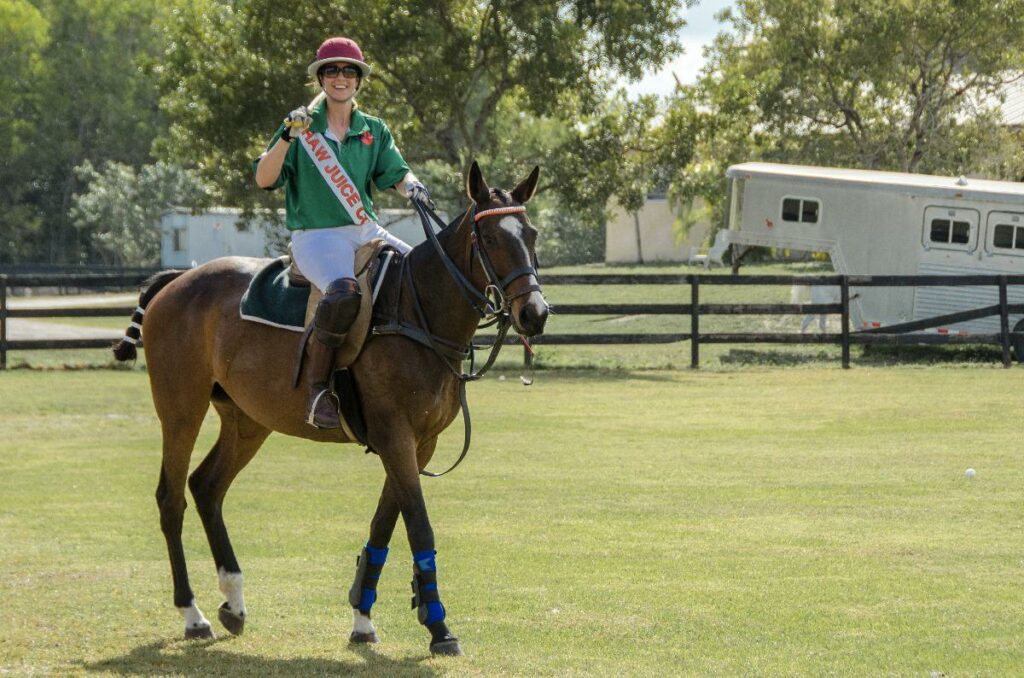
“There are a lot of specialists and very intelligent people at that practice, so the continual learning is incredibly valuable, especially as a young vet,” she acknowledged. “I learn every day. It is an amazing experience to be able to walk down the hall and knock on the door of one of the best board-certified surgeons or other specialist and say, ‘Hey, can you help me with this?’ You do not realize how beneficial that is until you leave, and you are in the middle of Western Canada and you wish that you had that.”
Originally from Winnipeg, Manitoba, Canada, Dr. Passante-Watt graduated from the Western College of Veterinary Medicine in Saskatoon, SK, in June 2012. After graduation, she moved west to Calgary, Alberta, and completed an internship in equine medicine and surgery at Moore Equine Veterinary Centre. She and her husband, who is also an equine veterinarian, relocated to South Florida in July of 2013 in order to pursue their equine veterinary careers.
Dr. Passante-Watt started riding when she was 10 years old and was a typical horse-crazy child. She took western riding lessons for a few years before falling in love with polo. When she was in high school, she got a job grooming and exercising polo horses in Winnipeg, which continued for six summers.
After high school, Dr. Passante-Watt was unsure what career path she wanted to take, so she embarked on a backpacking trip in Australia. She picked up small jobs while traveling, one being picking mangos. While on that mango farm, she found a small dog that was wounded from a fight with another dog. Dr. Passante-Watt took the dog, fixed his wounds, and nursed him back to health. It was that experience that inspired her to apply to veterinary school.
While attending vet school in Saskatoon, Dr. Passante-Watt met her husband, Dr. Walker Watt, and the pair got married in October of 2013. During his fourth year of vet school, Dr. Watt attended a conference and met some veterinarians from Teigland, Franklin, and Brokken, a racetrack practice at Gulfstream Park in Florida. He went to visit and did an externship there, later receiving a job offer. Dr. Watt and Dr. Passante-Watt then made the decision to move to Florida, where Dr. Watt took the racetrack job, and Dr. Passante-Watt found a position at Palm Beach Equine Clinic.
“Palm Beach Equine Clinic is a great practice,” Dr. Passante-Watt stated. “I have been working with Dr. Jorge Gomez, who works mainly on sport horses and more specifically on show jumpers, so it has been great getting involved in that world and receiving mentorship from Dr. Gomez. There is a lot of sport horse medicine that we do not see back home in Canada. It is a different world in Wellington; everything is a step ahead.”
The first year Dr. Passante-Watt and her husband moved to Florida, they stayed and worked for the full year. They then decided to split their time between the U.S. and Canada, just traveling to Florida for the winter season. They opened their own mobile practice in Western Canada, which Dr. Watt now runs year-round while his wife soaks up everything she can learn in Wellington throughout the winter.
“There is a lack of equine veterinarians in Southern Alberta where we live,” Dr. Passante-Watt explained. “There are a lot of mixed animal practitioners, but not a lot of specific equine practitioners, let alone in performance horses. That is why we decided to open a practice and just work on horses, and it has been going really well so far.”
Dr. Passante-Watt enjoys being able to draw on the resources of Palm Beach Equine Clinic even when she’s in Canada for the summer. “You can easily email people, send images, and pick up the phone and call someone with questions,” Dr. Passante-Watt stated. “I find everyone at Palm Beach Equine Clinic to be very helpful. As a vet early in my career, I think it is a great thing to work in a practice like that because it definitely pushes you to learn and be your best because you are working with the best.”
Having a state-of-the-art facility and equipment at Palm Beach Equine Clinic at her disposal throughout the winter is also a huge advantage.
“It is an amazing difference,” Dr. Passante-Watt noted. “I see both sides of it, because I am in Canada in the summer in my own small mobile practice with no bells and whistles, and then I come down to Palm Beach Equine Clinic and you have everything you could want at your fingertips. Every sort of pharmaceutical need, every tool, every cutting-edge technology, they just have it all right here. For the hospital, there are technicians and interns to monitor your cases overnight, and the 24-hour Intensive Care Unit is state-of-the-art. It is definitely set up to be successful, and with so many veterinarians, everyone is great about helping one another.”
Dr. Passante-Watt has many different veterinary interests, including diagnostic imaging, ophthalmology, lameness, dentistry and internal medicine. She really enjoys general practice, specializing in a little bit of everything. She is also certified in acupuncture and equine chiropractic from Options for Animals Chiropractic School.
As far as future goals, Dr. Passante-Watt plans to take it year by year, continuing to come to Palm Beach Equine Clinic in the winters, continuing to learn, and being the best veterinarian that she can be.
The process of breeding sport horses is ever-changing. Whether in an effort to produce the healthiest, most talented foals, to prolong the competition career of a mare, or make the most of a stallion’s longevity, reproductive science in horses has come a long way from the days of the traditional breeding shed.
Dr. Katie Atwood is a member of the Palm Beach Equine Clinic team, based in Wellington, FL, with a passion for reproductive work. She has used that passion to help Palm Beach Equine Clinic offer cutting edge breeding options all in the heart of the winter equestrian capital of the world.
“I like the creating of life,” said Dr. Atwood, who is a Florida native and University of Florida graduate and currently pursuing steps to become a board-certified reproductive specialist. “Equine medicine is intriguing, but you’re dealing with sick, unhealthy animals. With reproduction, I am working with healthy animals and making their babies, which I love!”
The Future of Breeding at Palm Beach Equine Clinic
PBEC is a one-stop shop for anyone’s breeding needs, whether it’s a champion polo pony, competing mare, or full-time breeding stallion. Atwood and the team at Palm Beach Equine Clinic work tirelessly to improve their offerings, which currently include a breeding shed covered from the heat and inclement weather just like an indoor arena. Inside the breeding shed, Palm Beach Equine Clinic houses a hydraulic phantom mare.
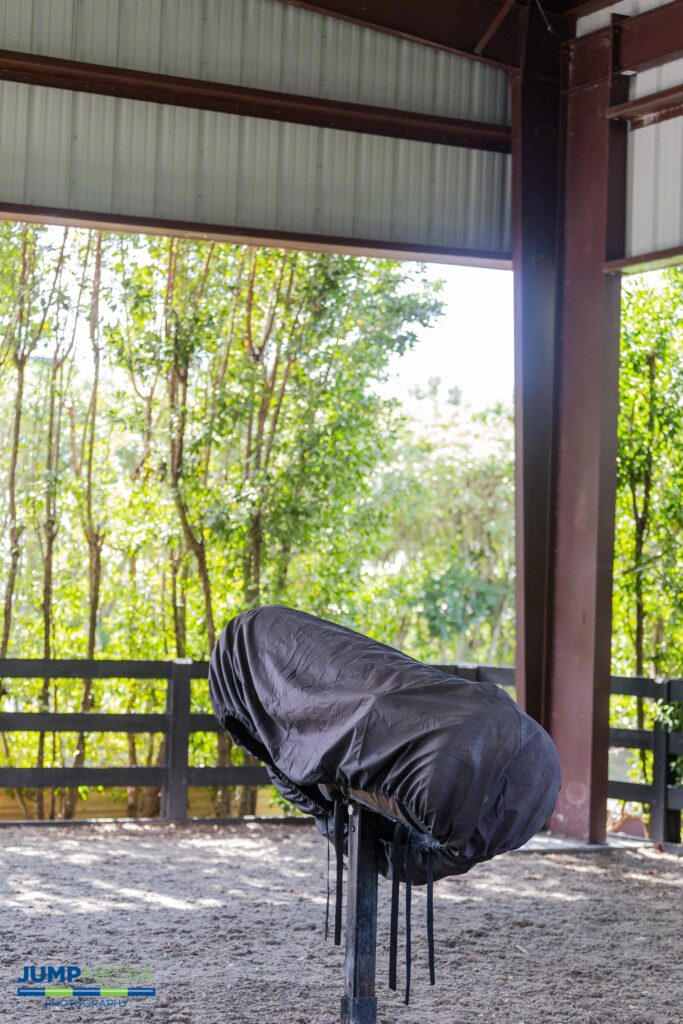
“We can raise or lower our phantom with the push of a button so it can be the appropriate height for the stallion,” said Dr. Atwood. “Previously, we had to bring a tractor in to raise and lower the phantom. We also do not have to take weather into consideration anymore now that the breeding shed is covered. There is enough space and privacy for safe and convenient breeding on-site at Palm Beach Equine Clinic.”
Additionally, Palm Beach Equine Clinic incorporates the use of a SCA® CASA (computer assisted sperm analyzer) system into their reproduction work. An excellent way to improve quality control of a stallion’s sperm, the system evaluates sperm motility (velocity and type of movement), concentration (sperm count), morphology (sperm shape), DNA fragmentation (counting of fragmented sperm), vitality (live and dead count) and acrosome reaction, which is what ultimately allows the sperm to penetrate the egg.
From on-site experience to computer technology, Palm Beach Equine Clinic offers Dr. Atwood the opportunity to be at the forefront of equine reproduction, a place she has always strived to be.
“I wanted to come into a practice that had a developed program in place, but what is even more important to me is mentoring and teaching my technicians and clients about reproduction,” she said. “It is so important to make sure these techniques are shared and promoted for the continued success of veterinarians, owners, and most of all the horses.”
What is Embryo Transfer?
The most popular wave of advancement that has hit the horse sport industry over the past several years is the process of embryo transfer.
Embryo Transfer Process:
- A donor mare and stallion, who hold the genetics of the future foal, are bred.
- At seven or eight days of pregnancy, the embryo is flushed out.
- A catheter is placed through the vagina and cervix, and an inflatable cuff on the catheter provides a fluid-tight seal.
- A lavage fluid with surfactin (added to reduce the “stickiness” of the embryo and allow it to be extracted easily) passes down through a tubing system into the uterine lumen. As the fluid swirls throughout the lumen and drains back out through gravity, it collects the embryo, which is swept back out. The fluid and embryo pass out through the tubing system into and through an embryonic filter.
- When the embryo is identified under a microscope, it is removed into a more enriched medium until the time of transfer.
- The embryo is shipped to a recipient farm where a young and healthy surrogate mare of decent size receives the embryo. That mare carries the foal to term, but it is genetically created from the donor mare and stallion.
Why Breed Through Embryo Transfer?
While the process is fascinating, some may wonder why it’s necessary. According to Dr. Atwood, it relieves much of the concern owners have about sport horse breeding.
Advantages for Mares
“The gestation period for a horse is 11 months, so you’re only getting one foal per year when you breed traditionally,” she said. “This allows a mare to produce multiple foals per year, but it also allows that mare to remain in competition. This process can be done on younger mares with no interruptions to their competition and training schedules.”
Horses are now being bred at an ideal reproductive age while they are still in training, which is made even more valuable by the fact that advances in equine science has prolonged the longevity of horses. While 16 or 17 was once the age of an older horse, now it’s commonly seen as the age when horses are winning in the show ring. Thanks to embryo transfer, these horses can enjoy longer, healthy careers and still produce the talent of the future.
Dr. Atwood has seen embryo transfers become popular in dressage and polo, but she has begun to see it span all disciplines, saying, “At the start of the season, I had one farm and a few mares, but now it has quickly grown to several farms with multiple mares at each. It is really taking off because people now realize it does not remove their mares from competition.”
Advantages for Stallions
The process not only keeps mares competing, but it allows stallions to cross continents. Frozen fertilized embryos from working polo ponies in the U.S. are now being shipped to Argentina where they are carried by mares and then trained by some of the best polo trainers in the world. On the flip side, semen can also be frozen and shipped to the U.S.
“Stallions are collected, the semen is placed with an extender and high nutrient base so the sperm has something to use for energy, and then cooled slowly until it is frozen in liquid nitrogen,” said Dr. Atwood. “Once frozen, it is theoretically good forever. Last year, I bred a mare with 1991 semen and she was successfully pregnant!”
At first glance, Dr. Santiago Demierre appears to be a young veterinarian making a name for himself in the field of equine medicine. A closer look, however, reveals that he is not only that but also an exceptional example of diligence; he’s also working to become an extraordinary veterinarian while speaking a second language all in a country that is 5,000 miles from his home.
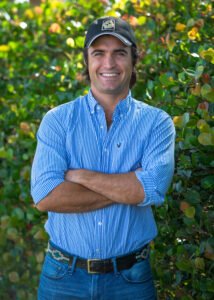
Born in San Antonio de Areco, a small town in the countryside outside Buenos Aires, Argentina, Dr. Demierre is now a 32-year-old veterinarian working with some of the most cutting-edge veterinary technology in the industry at Palm Beach Equine Clinic (PBEC) in Wellington, FL. He attended vet school at Universidad de Buenos Aires and graduated as Medico Veterinario in 2012 before setting a goal to validate his degree in the U.S. While mastering the English language, he enrolled in a certification program called the Educational Commission for Foreign Veterinary Graduates (ECFVG) through the American Veterinary Medicine Association and officially validated his degree in the U.S. in January 2017.
Today, Dr. Demierre is one of 40 veterinarians on staff at PBEC, which includes six boarded specialists and more than 80 technicians and staff members, making it one of the largest sport horse practices in the world.
Three things you may not know about Dr. Santiago Demierre:
1. Horses are in his blood.
Dr. Demierre: My father was a racehorse breeder and trainer, so while I was growing up I spent hours with him and the horses at the farm. I was always very interested in animals in general, not only horses, so even as a little kid I had the idea and the dream that I would be a veterinarian in order to be able to spend as much time with animals as I could. Now, I enjoy so many things about this work, but what really motivates me is the satisfaction I feel when I have a successful outcome on a case.
2. When the opportunity came to study veterinary medicine, he picked up and moved across the world.
Dr. Demierre: A fellow veterinarian who is a friend of mine, Dr. Eduardo Beccar Varela, contacted me with his nephew Dr. Axel Beccar Varela, who is a board-certified surgeon, and they offered me an externship at the clinic where he was practicing in Florida. I took that opportunity and began working in the U.S.
While here, a friend of mine, Gringo Colombres, introduced me to Dr. Scott Swerdlin, president of PBEC. He offered me an internship at PBEC in Wellington and I am now in my fourth season there.
The team at Palm Beach Equine Clinic is made up of great veterinarians and now great friends. There is always somebody from whom you can learn something new every day. Also, it is awesome to be in contact with the world’s top equine athletes. That is what I enjoy most about being part of the team at PBEC—working on performance horse cases. More specifically, I really like preventing and treating lameness in sport horses.
3. True to his Argentinian roots, he does some riding himself.
Dr. Demierre: I love being outdoors. When I am not treating patients or at the clinic, you can probably find me riding polo ponies. If I’m not there, I am either fishing, hunting, or enjoying some time off with my girlfriend.
Even after treating patients in both Argentina and North America, Dr. Demierre’s trans-continental bucket list is far from fulfilled. Next, he hopes to take the skills he has mastered at PBEC and validate his degree in Europe as well.
Want to learn more about the veterinarians of PBEC and what they have to offer your equine athlete or backyard companion horse? Call the clinic today at 561-793-1599 to learn more.
Meet PBEC Veterinarian Dr. Marilyn Connor
For some, becoming an equine veterinarian was always their calling. But, for Palm Beach Equine Clinic’s own Dr. Marilyn Connor, a diverse education and a healthy serving of life experience gave her options. Originally hailing from just north of Dallas, TX, Dr. Connor grew up around horses, but initially set her sights on going to medical school to study human medicine. Her undergraduate studies started at Tulane University in New Orleans, LA, before she transferred back to her home state of Texas to graduate in 2006 with honors from Texas A&M University with a Bachelor of Science degree in biomedical science and minors in chemistry and business.
After conducting a Master’s level research project on the effects of social stress on an animal model of multiple sclerosis, Dr. Connor broadened her horizons and moved to New York. While in New York, Dr. Connor spent three years as a research analyst and junior stock trader at a New York-based hedge fund. On her weekends, Dr. Connor volunteered at a therapeutic riding program in Brooklyn, NY, where she taught riding lessons to children, adults, and veterans. It was during her time volunteering at the therapeutic riding program, that Dr. Connor realized she wanted a career where she was able to help both people and animals. Ultimately, this passion lead her back to Texas where she attended four years of veterinary school at Texas A&M University.
Here’s the rest of Dr. Connor’s story
What led you to an internship at PBEC?
In veterinary medicine, unlike human medicine, it is optional to complete an internship after graduation before going into practice. It’s estimated that by completing an equine internship, because of the high caseload and number of hours worked, you gain anywhere from three to five years of experience. Because I was a non-traditional vet student, with a career before I started vet school, I really wanted to jumpstart my career so I could become an experienced veterinarian quickly. I felt that completing an internship was a good investment of my time, so I could get those additional hours of mentorship and become a excellent veterinarian. I considered many of the best practices in the country, mostly in California and Colorado, when searching for an internship. I met Dr. Swerdlin at an American Association of Equine Practitioners conference in Las Vegas two years ago and he invited me to come to Palm Beach Equine Clinic for a visit. I fell in love with the practice and the people, and felt the internship offered a good balance of autonomy to act as a doctor while still providing mentorship for a young veterinarian. One thing that’s unique about PBEC is that we have a full staff of technicians day and night so I knew, as an intern, I would be able to rest in the evenings so I could focus my time on learning and becoming a good veterinarian. In some practices, interns are expected to act as a doctor during the day, but at night they are required to come to the hospital to feed horses, cleaning stalls, or administer simple medications which could be done by a technician. Another big motivation for me was that we have so many doctors to collaborate with. During the peak of season, there are roughly 40 doctors here to learn and gain experience from. I was also impressed with the very diverse case load that comes into PBEC. Those are some of the reasons I joined PBEC as an intern in July 2017.
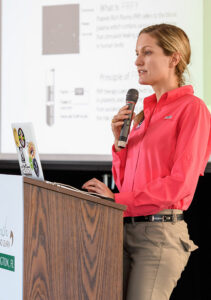
What is your experience with horses outside of being a veterinarian?
I like to say that I was riding horses since before I was born. My mom had horses and she rode while she was pregnant with me. When I was eight I got my first horse and rode western; mostly trails, pleasure, and a little bit of barrels, until I was twelve. Then I switched over to English riding and showed in both the Hunter and Jumper divisions until I was 18 and left for college. I didn’t have the means to bring a horse with me to school, so there was a period of about two years when I was only riding when I would come home.
During my sophomore year of college, I got a job at a barn exercising and training first and second-level dressage horses. Later in college, I had a friend who did competitive endurance racing and she had some spare horses that she needed ridden in competition so I did that and it’s something that I stayed with until today. As you can see, I have just about done it all when it comes to riding. I also have trained young horses and taught riding lessons since I was about 15 years old. After college, I spent some time teaching at a therapeutic riding center and this was one of the things that ultimately made me realize I wanted to be an equine veterinarian so that I could help both horses and the people that love them.
What is your typical day like at PBEC?
One of the things I love about being a veterinarian, is that no two days are the same! Most days, I come into the hospital first thing in the morning to, physical examinations and treatments on my hospitalized patients that are staying at PBEC. On some days, I manage anesthesia for the surgeries taking place at the clinic, so I must make sure the patient is physically healthy enough to handle anesthesia and undergo surgery. I then administer a combination of medications to induce and maintain them under general anesthesia for the surgery. I monitor them throughout the procedure and stay with them until they have fully recovered after surgery and are able to stand up and walk back to their stall. I am happy to report I will be staying on at Palm Beach Equine as an associate, so I am working on developing my client base within the clinic. now I make farm calls to see my patients and I also seeing many of the call-in appointments for routine veterinary care as well as daytime emergencies such as when people discover their horse has an injury or is sick. I have taken continuing education courses that are specific on dentistry, so I also see patients that require dental care such as having their teeth floated. I am also certified in veterinary chiropractic, so that’s another service that I bring to the clinic.
What’s your favorite kind of case to work on?
I like so many things about my job, but I really like helping my clients to maximize the health of their horses through nutrition, wellness care, and preventative medicine. I also like working with lameness in horses; diagnosing orthopedic conditions and treating them with a combination of traditional joint injections, regenerative medicine, rehabilitation, and alternative medicine. It’s very rewarding to help my equine patients to be able to do their job at a high level and stay sound. I also enjoy working with clients to understand things they can do to prevent their horse from needing those kind of interventions later on in life.
I do a lot of the veterinary care for the Vinceremos Therapeutic Riding Center, which PBEC supports. It is very rewarding to be able to give back to a cause that is important to me, but now in a different capacity as a veterinarian.
What do you enjoy most about working for PBEC?
One thing I enjoy about working at PBEC is that we are well-equipped with the most advanced technology and equipment rarely offered outside of a university setting. We have an amazing hospital facility, top quality surgeons, the latest in regenerative medicine, and the most advanced diagnostic tools including radiography, MRI, nuclear scintigraphy and our new Computed Tomography (CT) machine, which very few practices have. As a doctor, it is amazing to have every tool at my disposal, so I can provide the best quality veterinary care for my patients. But I think my favorite thing about working at PBEC and what really makes us unique as a practice is that we have an exceptional team of doctors with different backgrounds and slightly different skill sets. While every doctor essentially operates autonomously within the practice, it is still one big team. I have so many doctors I can call day or night if I am stumped on a case or need assurance that the treatment plan is appropriate. At PBEC we always collaborate to provide the best quality care for our patients.
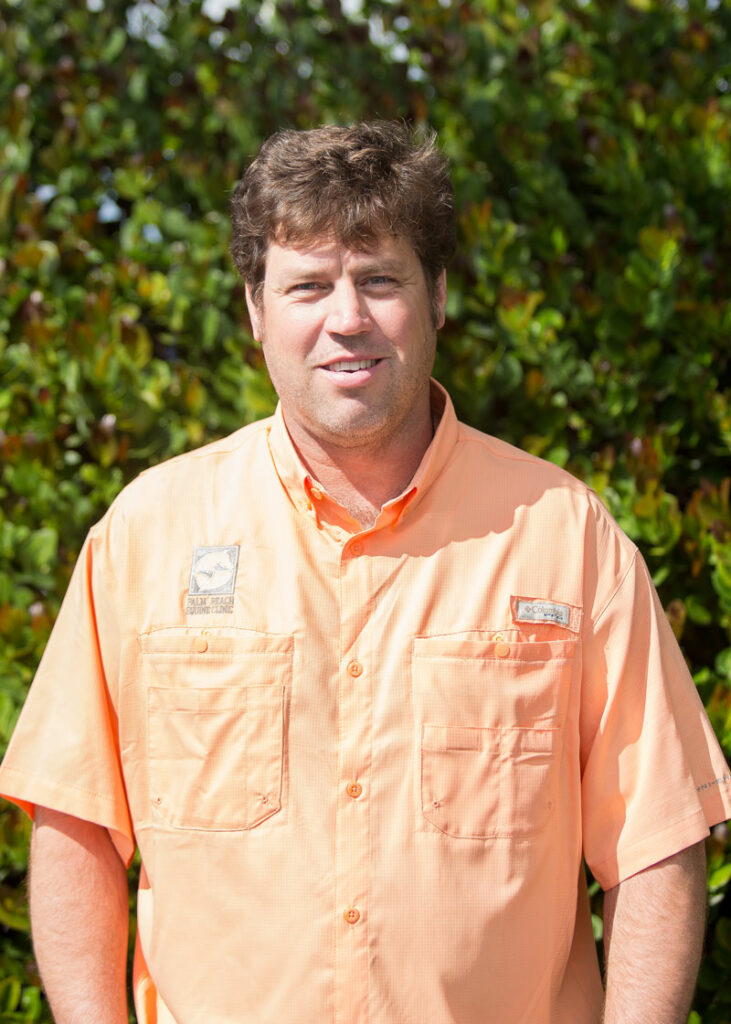
One of the repeatedly praised and recognized characteristics of Palm Beach Equine Clinic is the great pool of talented professionals from all specialties that make up the large team. In 2016, Dr. Peter Heidmann, DVM, MPH, began working with Palm Beach Equine Clinic for the winter season, and this year, the accomplished internal medicine specialist is returning to work with Palm Beach Equine Clinic for the duration of the 2018 winter season.
Dr. Heidmann graduated from Tufts University with his veterinary degree in 2000 before beginning a one-year internship in equine medicine and surgery at Arizona Equine, followed by a one-year surgical fellowship at Oregon State University, followed by a residency for internal medicine at the University of California, Davis, which he completed from 2002 to 2005. In 2005, Dr. Heidmann joined a private equine practice in Montana, and today he is the owner and hospital director of Montana Equine.
Q: What prompted you to pursue equine veterinary medicine?
I knew I wanted to be a vet for a long time, but I didn’t know that I wanted to practice more individually focused medicine until I was going through vet school. It wasn’t until my fourth year, where you’re actually starting to work with patients, that I made that realization. I started moving in that direction, and I had some faculty that saw the same for me and encouraged me to do the horse stuff. I always loved working with horses, but up until that time, I thought my background was too agricultural to do high-end sport horse work. But their encouragement helped me realize that wasn’t true. Then, I decided as a result of that realization and thought process, that I wanted to do an internship and residency to become specialized in internal medicine.
Q: What led you to Montana, and how has your role and practice evolved from when you started there in 2015 to today where you’re now the owner and hospital director of Montana Equine?
When I finished my residency at Davis in 2005, I wanted to be in the west. I wanted to be somewhere where there was nobody with my skill set – meaning internal medicine. I wanted to be in a small mountain town basically. Somewhere that I could practice the kind of medicine that I was trained to do but not in big metropolis. So, I narrowed it down to a practice in New Mexico and a practice in Montana. I went to work for a practice in Bozeman, MT, in July of 2005 and six months later my predecessor, Dr. Dave Catlin, passed away in a car crash. It was really sad. He had three kids, left a widow, and it was his dream to start an equine only specialty vet hospital, which he had done in 1999.
When he died, the conventional wisdom around Bozeman was, ‘Well this can’t be done. Dave had a dream, and it’s not a realizable dream now. There aren’t enough people here. Montana residents won’t understand specialized medicine and they won’t pay for it.’ I was faced with this proposition of leaving the practice after just arriving there, but I knew that was where I really wanted to be. I basically picked up the pieces of Dr. Catlin’s practice and formed Montana Equine in February of 2006.
Now we have a 7,500 square foot hospital with a surgery site at Bozeman, and I have a partner there, an associate, and two interns. We have two satellite locations: an ambulatory-only satellite in Helena, MT, and have nearly completed satellite clinic building in Billings, MT, which is the largest community in Montana.
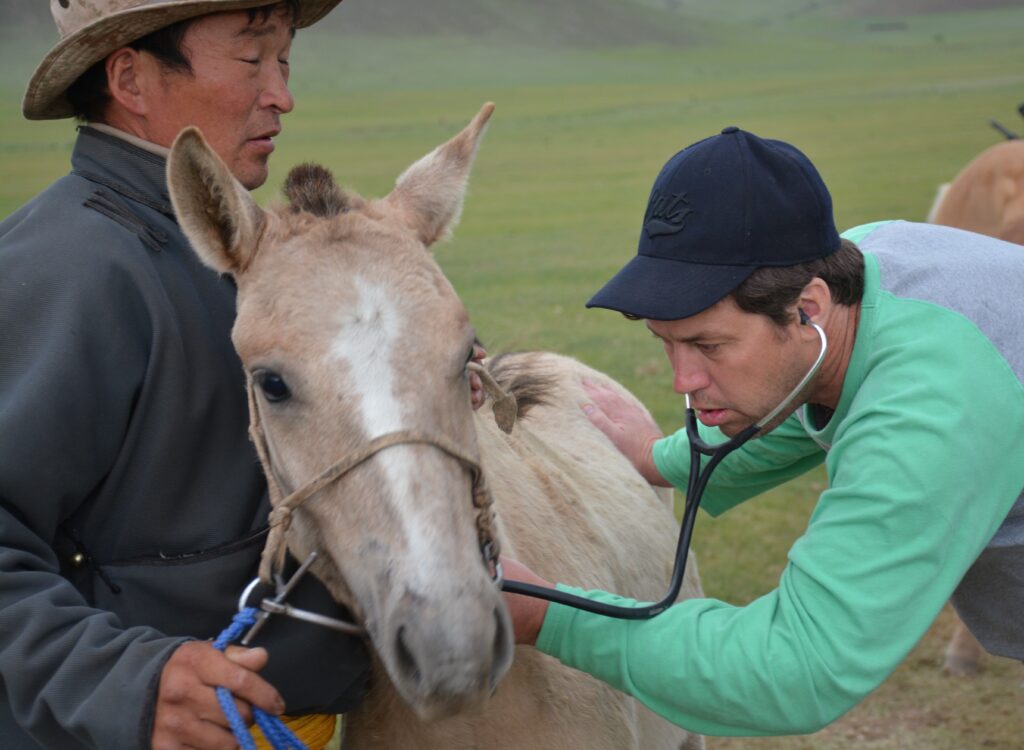
Q: You began working with Palm Beach Equine Clinic during the 2016 Winter Equestrian Festival (WEF) season, but you’re out in Montana and have your own practice there. How did that relationship come about, and what does it look like today?
There are various aspects to that. We’re very quiet in Montana from basically Thanksgiving through March, and it’s not really my personality to sit around. That’s one aspect, and another is from a business perspective, it allows me to bring more vets on and keep them year-round. A third element is the desire to do more high-end medicine, and a fourth element that led me to Wellington, is my wife, Allison, who is a professional jumper rider. Two years ago, during the winter of 2015, Allison had a girlfriend who had just had a baby and asked Allison to run her business for her here at WEF. I thought that was an interesting idea and started talking to Palm Beach Equine Clinic and found that there might be a need for an internal medicine specialist in their group. So that’s when I started coming. At that point, I was in Wellington for four or five days and then home for ten days, back and forth and back and forth. Then last year, I was more of a week here and a week at home. We had our first child, so Allison and Oliver, who was brand new then, were here straight through, but I went back home to Montana as well. The need is there and the relationship is great. So, this year, I’m in Wellington full-time for the WEF.
Q: What do you enjoy most about having the opportunity to practice with Palm Beach Equine Clinic?
It’s a huge group of people, so there are a lot of personalities. When you have a lot of different personalities, you have a lot of different perspectives on treatments, and that’s interesting and fun. It means that every year when I’m here, it’s pretty dynamic. Back in Bozeman, I have a great team, but I’m the leader of the team. I’m the oldest and the most experienced. That’s good, and that’s not to say that those guys don’t definitely come with new ideas, but being here, there are so many ways of doing things that I end up picking up new tricks or new ideas even though I’ve been practicing for most of two decades. So here at Palm Beach Equine Clinic, I’m picking up new strategies and new techniques separate from new stuff coming out in the world – just different ways of doing things, and different experienced veterinarians to bounce ideas off of. That’s really refreshing and stimulating.
From a vet’s perspective, with the Wellington demographic there is sometimes less of a limitation on budget and expense, so we’re really able to set that factor and worry aside and instead focus solely on what is best for the patient. The limitation isn’t financial; the limitation is just medicine and what we are able to do, which is exciting and allows us to see great results.
Q: Have you had any favorite cases or standout moments during your time with Palm Beach Equine Clinic thus far?
I won’t name any in particular, but what I really enjoy are the challenging medical cases, the internal medicine cases that tend to be really sick and that you’re able to fix. The most common ones that we see are probably sickness after colic surgery, horses with really bad diarrhea, so colitis cases, followed by foals. Those cases generally all have a lot of things going on in a lot of different organ systems. So, there are a lot of factors to balance. Internal medicine people like me are kind of inherently nerdy, and we really get into what’s happening with the acid-base status, electrolytes, blood gases, fluid volumes, and other technical aspects of horse medicine.
Q: What do you enjoy doing outside of work?
While in South Florida, we’re basically working all the time, so not as much here except trying to get exercise and be fit. I like to ride a bike or go for a run. At home, the Gallatin Valley – which is where Bozeman is – is surrounded all around by mountains. The valley floor at Bozeman is at about 5,000 feet, and the peaks are at 8,500, so you can do a lot of really serious hiking. Our son is only 18 months old, but he loves it. I’ve had dogs in the past where their whole personality changes when you get out of town, and that’s what Oliver is like too. It’s almost like his whole face is a different face when he’s out there.
Meet PBEC Veterinarian Dr. Natalia Novoa
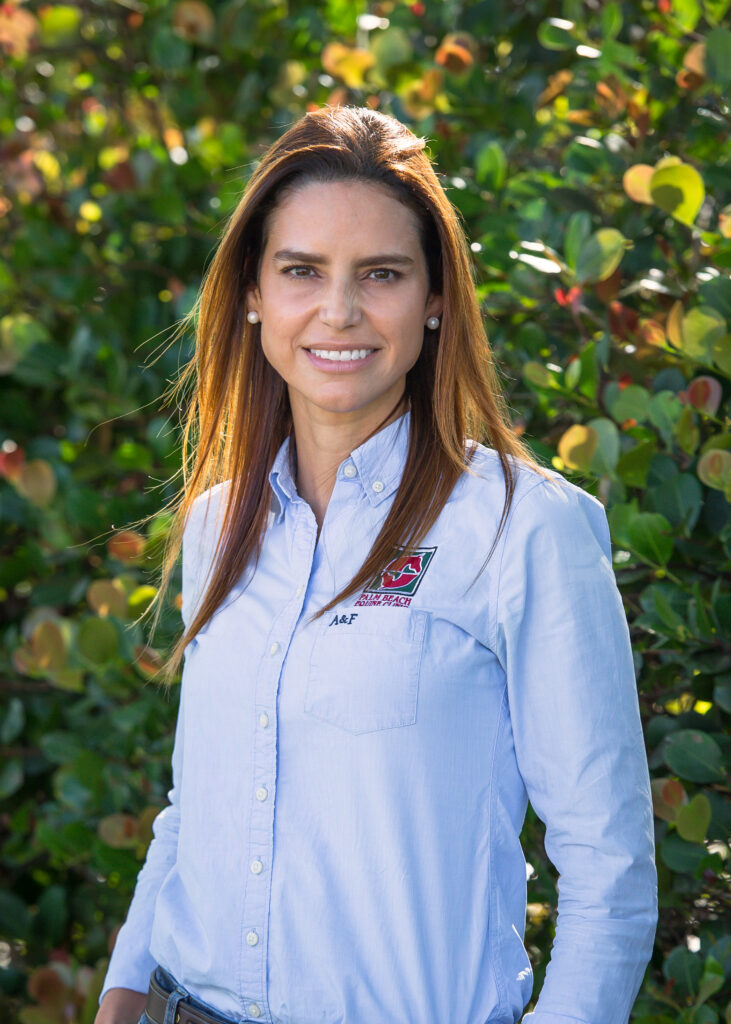
Dr. Natalia Novoa was born in Nashville, TN, and raised in Colombia, where she graduated from the University of La Salle. Upon returning to the United States, Novoa validated her degree in both the U.S. and Canada and received her chiropractic adjustments qualifications in Kansas and studied acupuncture in Florida. Novoa joined the Palm Beach Equine Clinic (PBEC) team for a short period in 2000, before spending several years following the hunter/jumper horse show circuit in Canada, Colorado, and Ocala, FL. She then re-joined the PBEC staff in 2011, and, with her veterinary license in Florida, Kentucky, North Carolina, and Canada, Novoa has been a valued member of their team ever since.
Q: How did you decide that you wanted to pursue veterinary medicine?
I have enjoyed having animals in my life since I was very young, but what was key to me deciding to pursue veterinary medicine was having a farm where I was able to gain skills and real-world experience that would prove handy down the road. I was able to practice with real medical cases and acquire knowledge in operational management, and it was an introduction to the lifestyle because it requires patience, hard work, commitment, determination, and accountability. It was a valuable opportunity to work hands-on in the environment with the veterinarian of my farm, absorbing, assimilating, and getting familiarized with the vet skills that were the building blocks for my future. He made me realize that veterinary medicine would fit me perfectly. That helped me set the foundation for my career, and since then, I didn’t have to look any further!
Q: What led you to PBEC?
I think of it like this: if I want to become the best at what I do then I have to work with the best, and I picked PBEC. They say, “Leadership is not about a title or designation. It’s about impact, influences, and inspiration.” Palm Beach Equine assumes the leadership role, chases the latest trends, and evolves continuously. In addition, we have a great team of skilled vets and staff who try to expand their vision and abilities to achieve success.
I have to say I have had seven great horse show seasons with Palm Beach Equine, and I’m looking forward to an eighth one. When you are doing what you love and you are working with great horses, time flies.
Q: What is your primary area of focus?

I focus on sports medicine and lameness, combining conventional medicine with alternative medicine; this includes chiropractic adjustments, acupuncture, and herbal therapy. To me those are great alternative tools for diagnosis and treatment. I have to say, they help you to look at a horse or a dog in a different way, and you have more tools and options. Regardless of the case – lameness, pain management, internal medicine, etc. – I have different choices to achieve results in those situations.
I perform chiropractic adjustments, acupuncture therapy, and laser treatments to small animals as well. Most horse people have dogs, so I’m able to take care of their companions too.
Q: What is a typical day like for you at PBEC?
It’s a busy agenda every day with continuous juggling. I’m usually dealing with lameness (involving diagnosis and treatment), doing pre-purchase exams, chiropractic adjustments, acupuncture therapies on horses and dogs, performing laser treatments, and at the end of the day, doing paperwork. Depending on the day, I could be doing FEI treatments, vet shift at the horse show, donating vet work at Vinceremos Therapeutic Riding Center, or dealing with an emergency. We’re a very mobile practice able to go from farm to farm and horse show to horse show (Kentucky; Tryon, NC; Ocala, FL), so I’m moving around a lot.
Q: What is your favorite part of the job?
There are so many aspects that I enjoy: working outdoors, closely with animals on a daily basis, and diagnosing and dealing with different issues to overcome problems; the privilege of working as a team with the clients and trainers and creating a great, close relationship with them; the connection with the animals and how they show you how grateful they are, and being able to see the improved outcome. There’s great satisfaction in successfully applying my knowledge and skills to a make a difference in someone’s life.

Q: Have you had any standout, favorite moments since beginning to work at PBEC?
When I had double success treating a ‘mystery’ case of a horse in which the owner was losing hope because other treatments were not showing good outcomes, and also treating her dog that was crying and unable to get in the car. The animals and owners were both happy and thankful. “For it is in giving that we receive” – having a positive impact on someone is correlated with high levels of overall job satisfaction.
Q: What do you enjoy doing outside of work?
I enjoy traveling with my daughter, Lola, and visiting my parents and siblings that live in different countries. I also love dancing to Latin music, running, playing tennis and squash. I’m a pretty competitive squash player, so I welcome any challengers!
Learn More About Surgeon Dr. Weston Davis
Dr. Weston Davis is a second-generation veterinarian from South Florida. His father is recently retired from veterinary medicine and his family raises beef cattle in Clewiston, FL. Dr. Davis graduated Magna Cum Laude from the University of Florida College Of Veterinary Medicine in 2008. He was awarded the Barbaro Gulfstream Scholarship (a veterinary scholarship named in honor of the amazing Barbaro), the Calder Race Course Scholarship, and the Student Award for Excellence in Large Animal Surgery.
After graduation, Dr. Davis completed his internship in Sports Medicine and Surgery at Oakridge Equine Hospital, followed by a residency in Equine Surgery at North Carolina State University. In 2012, he became board certified in Large Animal Surgery by the American College of Veterinary Surgeons. Before joining Palm Beach Equine Clinic, Dr. Davis spent 1.5 years as a staff surgeon at a private practice referral center in Texas. He has authored and co-authored publications on topics ranging from colic surgery to advanced imaging and novel surgical techniques. In 2014, he was awarded the BEVA Trust Peter Rossdale EVJ Open Award for a research publication on return to performance following colic surgery. He has spoken at several national and state meetings.
Dr. Davis is an avid sportsman himself, and his hobbies include fishing, hunting, waterskiing and almost any outdoor activity.
Tell us more about your background with horses growing up?
I started riding horses when I was so young I can’t remember. We had some amazingly kind horses that packed us around and took care of us (and a couple that didn’t). Riding as a child was mostly business – for the purpose of working cows. Somewhere around 14, I began team roping for pleasure and competition. I roped throughout college, but lost the required free time when I began practicing veterinary medicine. I’ll probably get after it again when I am retired and much too old to be doing that sort of thing!
When and why did you decide to become a veterinarian and why did you choose to pursue a career in surgery?
I decided to be a veterinarian very early in life.I had a father and uncle who were both successful and happy veterinarians whom I looked up to, so it was a logical path to follow. The surgical interests started as a kid watching my father do surgery, something I always thought was amazing and he was very skilled at. My decision to pursue the surgical avenue came during vet school when I realized that I wanted to specialize and knew surgery was my passion.
What is the best advice that your father has given you as a veterinarian?
My father is a man of few words. However, by watching him, I learned one of the biggest life lessons, which is to be calm and content with your career and your life.
What do you enjoy about speaking publicly and sharing your knowledge?
I think mentoring, sharing knowledge and teaching the hands-on skills to the next generation of veterinarians is one of the most fun and rewarding parts of my job. Observing a student as content and excelling in their career with a skill set that you contributed to, even in a small way, is a beautiful thing.
What is the most interesting or rewarding surgical case you have worked on?
Although minimally invasive arthroscopic type surgeries are my favorite to perform, I think colic surgeries are one of the most rewarding. They are often difficult surgeries and inevitably in the middle of the night, but you take a horse who would most certainly die without you, and save a life. Helping a horse who was in excruciating pain or has a life-threatening devitalized piece of intestine recover back to feeling comfortable and eating in their stall the next day is about as good as it gets.
What are your goals for your career now?
My goal is to expand the surgical and outpatient sports medicine referrals at PBEC. I am currently the coordinator for the intern and resident program. I plan to expand and improve on the quality of these mentoring programs within the industry. I am also working on the development and description of some novel minimally invasive surgical techniques. I aim to continue authoring 1-2 publications annually in the refereed equine literature.
When not roping, fishing, hunting or water-skiing, what other things do you do with your free time?
Most of my non-equine time lately has been devoted to some real-estate interests and house renovations. I am also a big reader.
Meet Dr. Janet Greenfield-Davis
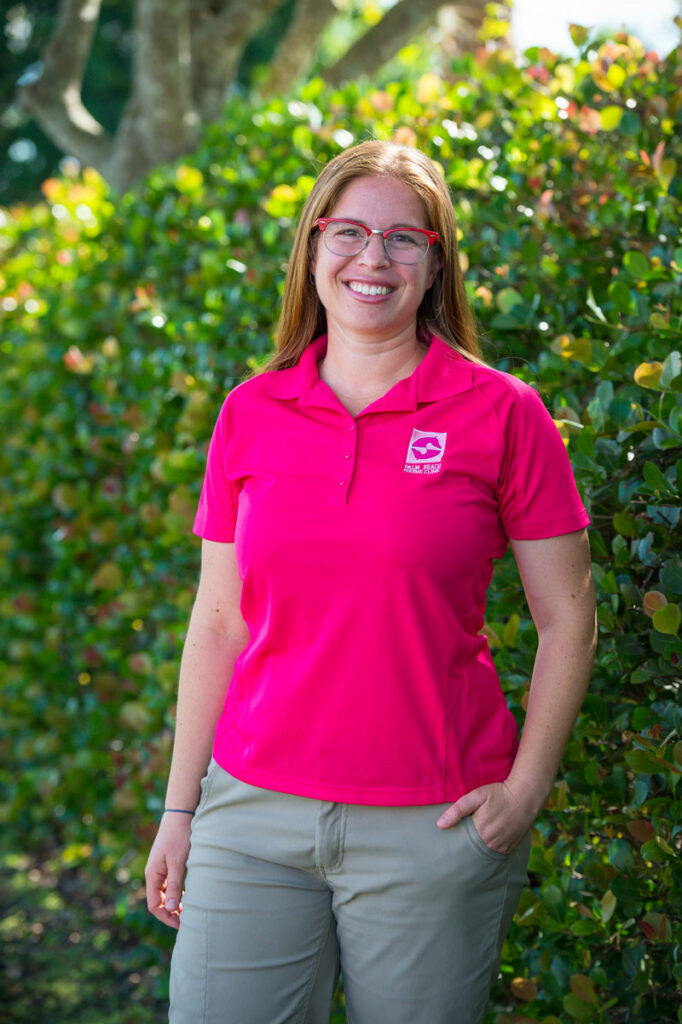
Dr. Janet Greenfield-Davis knew she wanted to be a veterinarian since elementary school. She grew up riding and competing on the hunter/jumper circuit in California before attending California Polytechnic State University and graduating from the University of Glasgow School of Veterinary Medicine in Glasgow, Scotland. Working alongside her husband Tyler Davis, Janet joined the Palm Beach Equine team as an intern before accepting a full-time position in 2010.
What inspired you to be a veterinarian?
I started riding at eight years old in a little field at the end of my street. As I started to grow up, my dad got me taking lessons and competing. He asked me one day when I was 11, ‘What do you want to be when you grow up’? I told him that I wanted to be a veterinarian and work on horses. He never let me forget that, so I grew up and became a veterinarian.
What is it like to work with your husband every day?
It’s wonderful. How many people can say that they get to see their significant other throughout the day, work on cases together, and bounce ideas off each other? We have worked together since the day we met. We went to school together, sat together in class and now we work together. I absolutely love it.
Have your children inherited the animal-lover gene?
Oh yes! We have two girls – Zella is two and Maisie is five months. Zella comes on calls with me regularly. She has her own toy stethoscope in my truck.
What is your specialty?
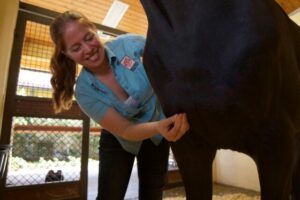
I specialize in acupuncture and herbal medicine. Both piqued my interest in vet school, and when I came to Palm Beach Equine, there was an opening for an acupuncturist. I really love having a way to treat animals without using drugs or steroids. It’s one more method to help equine athletes reach peak performance and is gaining more and more popularity. When I first started, people didn’t embrace it as much, but now even more doctors are starting to turn to it for cases they are not sure how to diagnose. With all the strict rules in FEI, it is a way to make a horse feel better without using drugs.
When you are not working, where can we find you?
Hanging out with my kids and my husband. We try to do family things as often as we can.
What advice would you give to someone considering vet school?
It’s a long, hard road but if you love it, it is so worth it.
What do you like about being on the Palm Beach Equine team?
We have all the diagnostic equipment we could ever need, and I love the quality of practitioners that we have at our practice. We always work as a team – everyone’s number-one goal is the best care for horses and animals in general.
Name one thing most people don’t know about you?
I used to swing dance. I taught lessons and performed for a long time.

